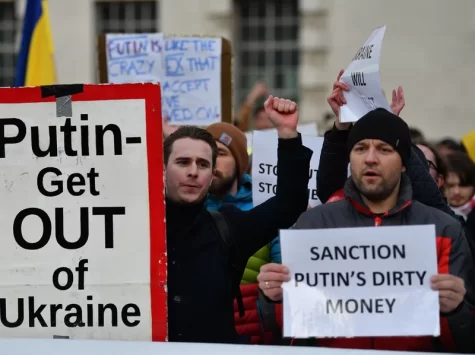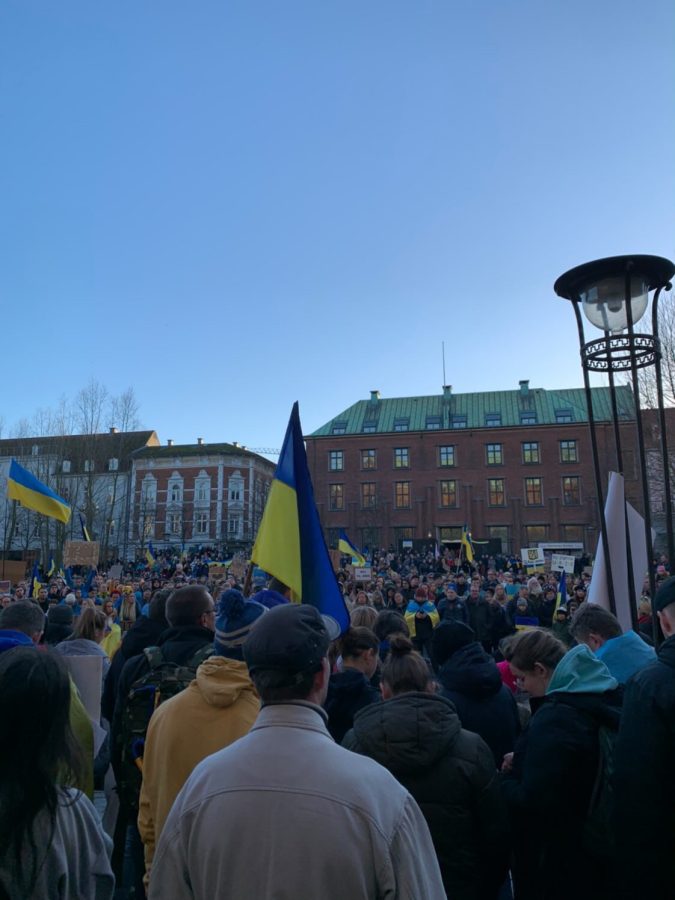“I started crying because I thought that this was it.” Ukrainian teenager Liza Lindholt details her perspective of the Russia-Ukraine war
In the Ukrainian city Kharkiv, Russian forces have bombed and destroyed numerous residential and community buildings, including this school.
March 2, 2022
Liza Lindholt was driving home from her night job, listening to the radio, as she always does on her commute. But suddenly, an announcement came on. It confirmed Lindholt’s greatest fear. Tears began streaming down her face. Lindholt’s home was under siege.
Russia launched an invasion of its neighboring country, Ukraine, on Feb. 24, targeting large cities such as the capital, Kyiv. U.S. officials predicted that Kyiv would fall within 48 hours, but the capital has since remained in Ukrainian control as civilians and Ukrainian soldiers bravely face off with Russian soldiers.
“When [Putin] claimed that [the separatist regions] are independent states, that’s when it clicked that he’s not messing around,” Lindholt said.
Within the last couple of months, the political tension between Russia and Ukraine has intensified, now culminating in Russia’s violent invasion of the former USSR member.
“If you asked me a year ago, I wouldn’t have thought that Russia was going to start taking over all of Ukraine,” Lindholt said. “I don’t think my peers and I thought that it would get to this point. Although it was in our minds for the last few months, Russia has always been around in the background.”
Lindholt, an 18-year-old student in Denmark, has not lived in Ukraine since 2019. However, considers herself Ukrainian and lived there for the majority of her life. Lindholt’s parents were still in Ukraine when the invasion began. They lived in Kyiv before moving to Lviv, one of the furthest western Ukrainian cities, when warnings of a Russian invasion became more imminent in the recent weeks. Their plans to return to Kyiv were diminished upon Russian President Vladimir Putin’s dispatch of troops to perform “peacekeeping functions” in the seperatist regions in eastern Ukraine.
“When [Putin] claimed that [the separatist regions] are regions of his own, that’s when it clicked that he’s not messing around,” Lindholt said.
“When [Putin] claimed that [the separatist regions] are independent states, that’s when it clicked that he’s not messing around, — Liza Lindholt
Lindholt’s father woke up just when the invasion started at 4 a.m. Within 20 minutes, he woke up Lindholt’s mother and grandmother, packed and drove to the Poland-Ukraine border. To cross, they needed a green card, and Lindholt’s grandmother needed a visa as well as a COVID-19 test. During the process of acquiring all the necessary documents, the Wi-Fi went out. Eventually, the Wi-Fi came back for a short period, and they were able to download all the documents to successfully leave Ukraine and enter Poland. Lindholt’s family is on the way to Denmark now.
Lindholt emphasized that her family was one of the lucky families to make it safely out of Ukraine.
“I have a few friends that are at the border right now,” Lindholt said. “And it’s going to take them days to get through because there are thousands and thousands of cars by the border. People are running out of food and water and gas from just standing at the border trying to get through to Poland.”
Lindholt’s parents and grandmother were able to escape Ukraine, but many other citizens cannot follow suit after Ukraine’s president, Volodymyr Zelenskyy, banned men from ages 18 to 60 from leaving the country.
Lindholt’s mother’s cousin and her cousin’s husband are one of the many Ukrainians staying in the country.
“They’re both doctors in western Ukraine,” Lindholt said. “I don’t think they are in uniform yet. But I think the time will come. They have a 9-year-old daughter, and I don’t know what will happen to her when her parents join the military.”
Ukranians who still reside in the country are not the only people taking up the fight against Russian forces, according to Lindholt.
“I’m hearing news of Ukrainians who live in Denmark, who are going back to Ukraine,” Lindholt said. “They’re leaving peace to go and fight for their home country. I think without the draft, [Ukraine] would have had enough people willing to fight because we’ve been oppressed for so long.”
The U.S. and other NATO countries have implemented sanctions to hurt Russia’s economy as a way to avoid a full-scale war. Recently, the U.S., European Union (EU), United Kingdom and Canada pledged to remove certain Russian banks from SWIFT, the messaging service that connects financial institutions around the world. The goal is to harm the banks’ ability to operate globally in the international financial system.

The Swiss Federal Council announced that it would freeze Russian financial assets in Switzerland, including Putin’s. This is a change from the traditionally neutral country as it joins other EU nations in implementing sanctions against Russia. The country also joined other European nations in closing off airspace to Russian aircrafts.
Lindholt is one of the many Ukrainians who believe that sanctions are not the best NATO countries can do to help. NATO, including the U.S., does not plan on providing soldiers to the Ukrainian army, fearing military retribution from Russia.
“We thought that Europe and NATO would support us more than they are,” Lindholt said. “But they’re now saying they’re not sending any soldiers over at all. Ukraine feels rather alone. Although I do understand NATO’s reasoning for not sending soldiers, at the same time, I feel like they could be implementing more sanctions and no-fly zones over Ukraine, or at least Kyiv, because that’s what’s hitting us hard; we don’t have many air weapons.”
A no-fly zone is designed to stop aircrafts from flying over a certain region. A no-fly zone in Ukraine would mean that Western forces would actively shoot down Russian planes – a step that NATO says would be too drastic.
Even with sanctions being met less enthusiastically by some Ukainians, many are still thankful for the assistance.
“A few days ago, Kyiv received a shipment of anti-tank weapons, and they were very useful when Russia attacked Kyiv,” Lindholt said.
Additionally, citizens across Europe have protested the invasion.
“It’s nice to see that citizens of other EU countries are showing support and love for our country,” said Lindholt.
Even in Russia, anti-war protests have occurred, despite the risks of arrest and punishment. Over four days, Russia has detained 6,000 of their own people. Lindholt tries to make the distinction that Russian leaders and the government are who attacked Ukraine, not citizens.
“I do feel for Russian citizens, especially the youth because I do think that they want to change [Russia],” Lindholt said. “But, it’s also Russian citizens who are taking orders from Putin and listening to him.”
This war is the first major global and military conflict to be accessible through social media, especially on Twitter and TikTok.
“If you wanted to see a dead Russian soldier, there’s a video of it,” Lindholt said. “You could find it easily.”
Some young users are turning the event into memes, and outsiders are rationalizing the violence in order to cope with it.
“We, as Ukrainians, think that you shouldn’t really be coping,” Lindholt said. “Ukrainians aren’t making jokes about it.”
Lindholt sees these “coping mechanisms” online as hurtful to her and her country.
“People think like they can take the situation that’s about our country and try to make it about them to a certain extent, like, ‘Oh, we’re gonna get drafted,’” Lindholt said. “No, you’re not going to be drafted. Soldiers aren’t going to be sent to Ukraine. We’re happy that you’re talking about the invasion, but we wish that you would educate yourself before you post.”
As for the end of this war, Lindholt has faith that Russia will be discouraged from continuing any harsh action against Ukraine. U.S. officials’ prediction of Ukraine’s quick fall has since been disproven by Ukrainian bravery. Putin likely expected Ukraine and Kyiv to be an easy target and was underprepared to handle the large number of patriotic Ukrainian citizens defending their own towns.
“I don’t think [Putin] expected this resilience,” Lindholt said.
Ukrainains have been urged to make homemade Molotov cocktails and have even handed them out publicly to use against Russian soldiers. Some citizens have removed or vandalized street signs to confuse Russians of their specific location. The Ukrainian government has also armed citizens with rifles.
Even countries away, Lindholt continuously attends protests near her home and remains active on social media to post pictures and spread awareness of the situation.
Lindholt wants Americans to properly educate themselves on the war and avoid Russian-backed propaganda. Kyiv Independent is a reputable and reliable source for information relating to the war and is active on Twitter with updates.
Despite the severity of the war and the deaths of many Ukranians, Lindholt remains hopeful for Ukraine’s future.
“I think it’ll be a few years before it’s safe, but we don’t think that it’s lost,” Lindholt said. “Ukraine’s had a rough past. It’s never been fully certain in any way, shape or form. We’ve had s—– presidents. We’ve had a ton of bumps in the road. And this is a very, very big one.”
Links to donate:
UNICEF: Help Ukrainian children and families
Rescue.org: Learn more about the war and donate to help displaced Ukrainian families




